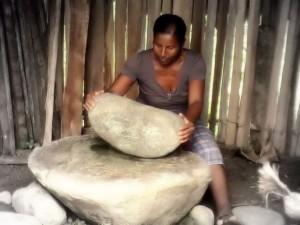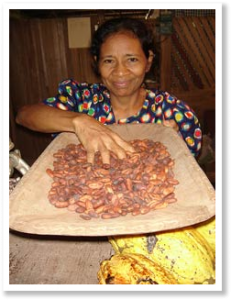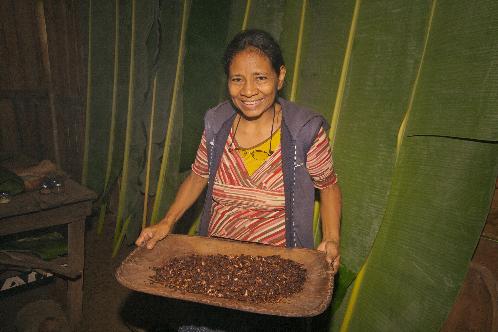Costa Rica News – Before Columbus…Before the ‘third wave’, the ‘second wave’, the ‘first wave’ of feminism…Before the Catholic Church and the heavily patriarchal patterns of European settler populations descended on Latin America…Before people oft-unknowingly attributed the origins of ‘feminism’ to white women of the western world…
 …the Bribri Peoples of modern day Costa Rica were living out a matriarchal legacy and tradition that continues, uninterrupted, to this day…
…the Bribri Peoples of modern day Costa Rica were living out a matriarchal legacy and tradition that continues, uninterrupted, to this day…
As far as the new and diverse waves of feminism go, the women in Latin America seem to be consistently defining and carving out a more holistic, community-centered approach in the veritably broad spectrum of feminist ideology that exists today. Many Indigenous Women in Latin America have described not identifying with the individualist models of ‘feminismo’, as are often conceived in the United States and innocently enough proselyted abroad. The new wave of feminism that is being led by las mujeres de América Latina (the women of Latin America) is community focused. It’s not about proving what one woman can do on her own, or proving that she can succeed as a man in a ‘man’s world’. It is by exceedingly stark contrast about proving what one can do for the greater community, and perhaps as the scope naturally broadens, what one can do for the world.
Noemy Blanco Salazar, one of the Bribi matriarchs living in Amubri, Costa Rica, recently opened up a window into the Bribri’s matriarchal world. When queried about the matriarchal Bribri way and what it embodies for rest of the world, and especially women everywhere, Noemy relates:
“We are heirs of life, we have to assume this mission that SIBU {Bribri God} proudly entrusted, with dignity. We must strive to build valuable ways [of being] for society. Mother Earth energy is the force that grows in our spirit.”
This mission that the Bribri collectively took on, to live out the matriarchal vision in alignment with the Earth Mother, is one that can and should inspire women leaders, activists, scholars, freethinkers, and seekers and defenders of a world in balance, everywhere.
Perhaps by nature of (and a tribute to) this feminine base of dignity and strength, the Bribri currently have a tenacious grasp on their traditional tribal language and sustain a robust indigenous culture, even as the surrounding nation of Costa Rica has kept pace with many of the homogenizing development patterns that globalization brings1.
Amidst their remarkable feats in sustaining these hallmarks of cultural preservation, the Bribri in Talamanca also fortify their tribal culture through community radio. Globalization is always looking for a way in, however, and Noemy relates that this makes it a challenge to hold the vision of matriarchy, as the outside system seems explicitly and implicitly determined to displace it. The presence of banana plantations, notably (for all the wrong reasons) those of Chiquita, has been one such lifestyle invasion. The nature of fruit industry work and the preference for male workers undermined the traditional matriarchal structure of the Bribri clans, on the one hand. The industry, however, brings other problems as well. The unrestrained use of pesticides that the fruit giant favors has brought ubiquitous contamination to the land and water supply. According to Salazar, the banana brand’s presence has put the community at a high risk for health problems, including but not limited to, fertility issues in women and developmental issues in children.
fortify their tribal culture through community radio. Globalization is always looking for a way in, however, and Noemy relates that this makes it a challenge to hold the vision of matriarchy, as the outside system seems explicitly and implicitly determined to displace it. The presence of banana plantations, notably (for all the wrong reasons) those of Chiquita, has been one such lifestyle invasion. The nature of fruit industry work and the preference for male workers undermined the traditional matriarchal structure of the Bribri clans, on the one hand. The industry, however, brings other problems as well. The unrestrained use of pesticides that the fruit giant favors has brought ubiquitous contamination to the land and water supply. According to Salazar, the banana brand’s presence has put the community at a high risk for health problems, including but not limited to, fertility issues in women and developmental issues in children.
Fortunately, as Salazar further explains, the Bribri community has “a very strong awareness that allows us to preserve, to strengthen, the values and customs of the culture.” There is currently a matriarch-centered movement to generate new avenues of revenue for the community. Many men are, at present, supportive of this shift (and patently relieved at the opportunity to move out of the banana industry and its myriad health risks). However, Salazar relates that the men who are under the influence of “formal education” tend to have less respect for the matriarchal ways:
“The public school system does not put traditional indigenous education in context, and instead promotes an individualistic ideology that prioritizes foreign knowledge over our traditional community indigenous values, system and customs as something valuable.”
Regardless, the women are consciously moving forward in entrepreneurial endeavors around ecotourism ventures, organic agriculture, crafts, food and traditional beverages, and educational opportunities. Salazar herself is directly involved with organizing and facilitating the infrastructure and instruction for a graduate level course on Indigenous Rights Law in the Field led by Adilia Caravaca and Mihir Kanade through the University For Peace in Ciudad Colón, Costa Rica. (As a separate endeavor, Caravaca has also spent time with the Bribri matriarchs, empowering them directly with knowledge on navigating the world of Indigenous Rights Law, as is her specialty.)
The Bribri’s matriarchal clan structure means that tribal lineage is passed down through the mother, and knowledge and tradition is passed down by the grandmother. As Salazar dictates,
“Our close relationship to our grandmothers is a pillar of knowledge…We transmit the value of life in our approach to Mother Nature as an experiential space every day; in work in the kitchen, at the ceremony, and in the upbringing of our children.”
Feminism around the world is catching up with the Bribri vision on many levels. No one model can perhaps ever speak for all women but the Bribri experience seems to truly embody and express the key concepts and constructs aligned with the more holistic, rising model of ecofeminism. Noted ecofeminist, Vandana Shiva has articulated similar notions of how women have a special connection to the environment through their daily interactions, and waxes on the extensive consequences of this connection being ignored. She says that women in subsistence economies who produce “wealth in partnership with nature, have been experts in their own right of holistic and ecological knowledge of nature’s processes.” The world has no doubt reached the time and place to recognize this formally.
by Courtney Parker, http://intercontinentalcry.org/
Top photo in this article credit to Courtney Parker

